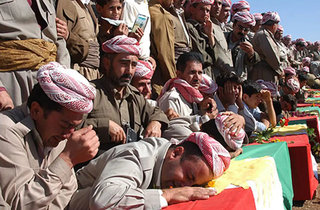Launched in February 1988, this eight-stage operation aimed to eradicate the Kurds through mass executions, chemical weapons attacks, and the large-scale destruction of Kurdish villages and infrastructure.
Tensions between the Iraqi government and the Kurds had simmered for decades, fueled by Kurdish aspirations for autonomy within Iraq. The Iran-Iraq War (1980-1988) further strained relations, with the Iraqi regime viewing the Kurds with suspicion due to their ties with Iran. The Anfal Campaign became a horrific culmination of these tensions, a calculated attempt to break Kurdish resistance and reshape the demographics of northern Iraq.
The Brutal Reality of Anfal
The eight stages of the Anfal Campaign unfolded with escalating brutality. Mass expulsions forced Kurds from their ancestral lands, disrupting their way of life and severing their connection to the earth. Chemical weapons attacks, most notably the infamous Halabja massacre, inflicted unimaginable suffering on innocent civilians. Forced disappearances became commonplace, leaving families with agonizing uncertainty about the fate of loved ones.
The human cost of the Anfal Campaign was staggering. Estimates of the death toll range from 50,000 to 182,000, a devastating loss for the Kurdish people. Beyond the immediate loss of life, the campaign inflicted lasting trauma. Survivors carry the physical and psychological scars of the attacks, and the Kurdish community grapples with the loss of cultural heritage and a sense of collective security.
Seeking Justice and Healing
The fall of the Ba'ath regime brought a ray of hope for accountability. In 2007, Iraq's Supreme Criminal Court recognized the Anfal Campaign as genocide, a long-awaited validation of the Kurdish experience. Mass graves, unearthed after the regime's collapse, provided chilling evidence of the atrocities committed. However, the path to justice remains long. Many perpetrators remain at large, and the full picture of the campaign's horrors continues to emerge.
Remembering for the Future
The Kurdistan Regional Government established April 14th as a day of remembrance for the victims of Anfal. This day serves not only to honor the dead but also as a stark reminder of the dangers of unchecked state power and ethnic violence. The Anfal Campaign serves as a cautionary tale for the world, highlighting the importance of international cooperation in preventing such atrocities and ensuring accountability for those who commit them.
While the wounds of the Anfal Campaign remain deep, the Kurdish people have shown remarkable resilience. Kurdistan today is a beacon of stability in a troubled region. However, the legacy of Anfal continues to cast a long shadow. Moving forward, addressing the trauma of the past and fostering reconciliation within Iraqi society will be crucial for lasting peace and stability. (ILKHA)



 Güncel
Güncel
 Güncel
Güncel
 Dünya
Dünya
 Dünya
Dünya
 Güncel
Güncel
 Dünya
Dünya
 Güncel
Güncel
 Dünya
Dünya
 Dünya
Dünya
 Dünya
Dünya





